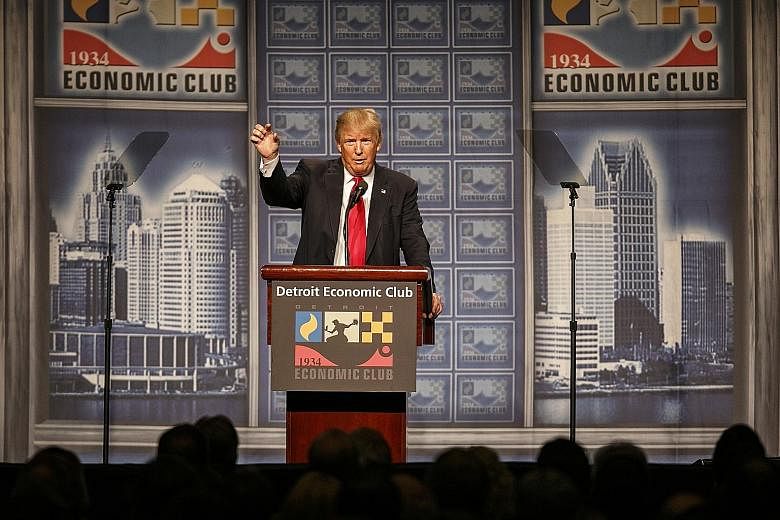Tax cuts, while for all, will benefit top earners most; trade and climate accords get short shrift
DETROIT • Mr Donald Trump has sought to move beyond a week of turmoil, using a major policy address to cast himself as a president who could bring new jobs and prosperity to the US, and warning that his rival, Mrs Hillary Clinton, would be a steward of stagnation.
Saying he wanted "a conversation about how to make America great again for everyone, and especially those who have the very least", Mr Trump on Monday unveiled plans to simplify the tax system, rethink America's energy policy and tear up trade agreements.
He chose Detroit for his speech - though interrupted frequently by protesters - clearly to appeal to the working class at the centre of his political strategy.
It offered a broad view of the economic agenda of a President Trump: tax policies close to what Republicans in Congress have long advocated, including deep tax cuts for the wealthy and a light touch in regulation, but much more willingness to disrupt longstanding trade agreements and international economic relationships in hopes of reducing the trade deficit.
He embraced a tax plan issued by House Republicans this year that, although it would reduce taxes on all Americans, would offer particularly big tax cuts for the affluent: it would reduce the tax rate on the highest earners to 33 per cent, from 39.6 per cent now, apparently replacing his proposal last September to cut the top rate to 25 per cent.
He also called for ending what Republicans label the "death tax", not mentioning that the estate tax currently exempts the first US$5.45 million (S$7.35 million) for an individual and US$10.9 million for a married couple - meaning that only the very wealthy pay anything.
Mr Trump also advocated "allowing parents to fully deduct the average cost of child-care spending from their taxes".
But the way the tax code works, this would give the greatest advantage to upper-middle-class and wealthier families, and little to no benefit for vast numbers of low-income families, many of whom pay little or no federal income tax, so a tax deduction would not help them.
An e-mail statement added that the policy would have elements to provide child-care benefits to lower-income people.
The real estate tycoon also advocated reducing the corporate income tax rate to 15 per cent from its current 35 per cent.
Mr Trump said, accurately, that the proposal he has adopted would reduce federal taxes across the board. But an analysis by the Tax Foundation found that it would increase after-tax income for middle- income families (those in the 40th to 60th percentile) by 0.2 per cent. It would increase after-tax income for the wealthiest 1 per cent of Americans by 5.3 per cent.
He proposed a moratorium on new regulations that will warm the hearts of business interests that have complained of excessive regulation in the Obama era.
On energy policy, Mr Trump reiterated his pledge to tear up the Paris climate agreement and halt US payments to the United Nations for programmes to reduce global warming. He said energy regulations were killing manufacturing jobs.
Mr Trump is more hostile on trade, where he departs from Republican economic orthodoxy.
By pledging a much tougher line, including abandoning the Trans-Pacific Partnership and renegotiating the North American Free Trade Agreement, he put himself directly at odds with the US Chamber of Commerce and other business groups.
NEW YORK TIMES

